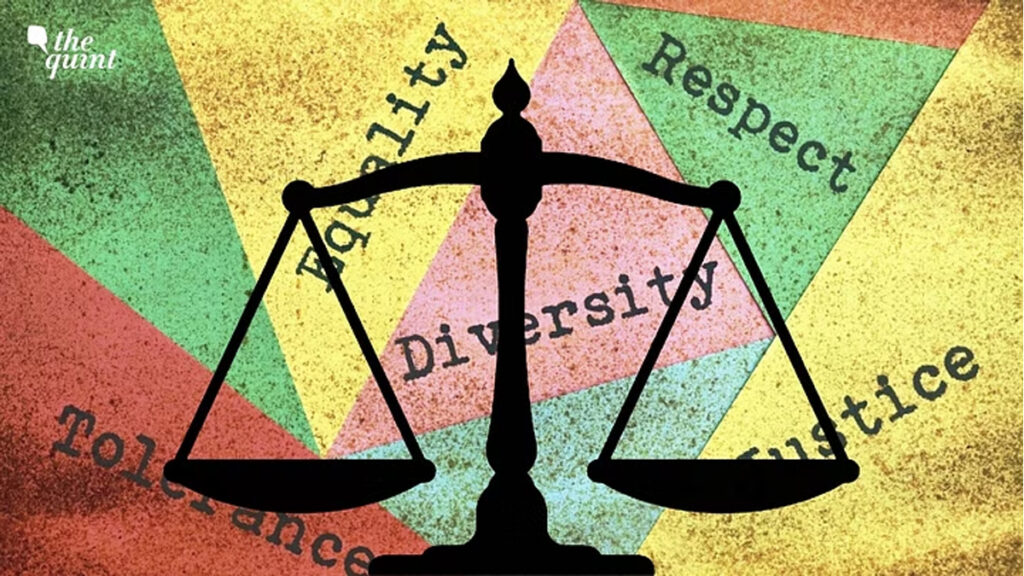A study of personal laws in India: Uniform Civil Code vs. Personal Freedom.
-Authors: Rewa Sharma, Parth Mayekar, Priyanshi Jha, Gargee Deshpande
Introduction
Indian personal laws regulate key domains of life like marriage, divorce, inheritance, and adoption, each influenced by religious practices. The Uniform Civil Code (UCC), contemplated under Article 44 of the Indian Constitution, aims to introduce a uniform code of civil laws for all citizens. This move has intensified controversies related to equality, secularism, and religious freedom. The supporters contend that the UCC advances gender justice and national integration through ensuring uniformity in legal issues, while the opponents worry that it jeopardizes cultural identities and religious autonomy.
The current controversy over the UCC captures opposing forces of legal uniformity and individual liberties and raises issues over its impact on individual rights as well as group rights of religious groups. The major concerns are about whether the adoption of a UCC would promote or undermine individual freedoms and whether it would reconcile or clash with India’s plural legal traditions.
In order to understand these questions, this article will seek to discuss the idea of the UCC and its intended application in India, investigate the conflict between individual freedoms and personal laws, and assess the advantages and disadvantages of having a uniform legal code. Some of the important questions that will be asked are how individual freedoms are affected by personal laws, why a UCC should or should not be implemented, and how the UCC is related to the religious and cultural rights of communities.
Abstract
This research explores the intricate and usually controversial topic of personal laws in India, with particular reference to the controversy regarding the Uniform Civil Code (UCC) and its implications for personal liberty. The legal system in India permits the coexistence of different personal laws, founded on religion, community, and cultural traditions, that regularise issues like marriage, divorce, inheritance, and adoption. The UCC envisions one uniform law applicable to all citizens, regardless of religion. This study analyzes the historical context, legal structure, and socio-political environment of personal laws in India, comparing it with the possible effects of the UCC on individual freedom and rights. The research critically examines and evaluates the pros and cons of the Uniform Civil Code (UCC), taking into account gender equality, religious liberty, and national integration.It considers whether a unified legal code can either safeguard or violate an individual’s liberties and the autonomy of the cultural identities of Indian citizens. Ultimately, the research aims to present an educated opinion on the effect of the struggle between the Uniform Civil Code (UCC) and personal laws on the basic liberties of individuals, especially those that belong to oppressed groups.
Literature Review
The personal laws of India have been molded by religious philosophies and colonialism, such that various legal systems prevail for Hindu, Muslim, Christian, and Parsi groups. Whereas Hindu personal laws were legislated in the 1950s, other groups remain bound by various legal systems founded on religious law. These personal laws cover issues of family life like marriage, divorce, and inheritance and create legal inequalities in rights and protections across groups.
The idea of a UCC, described in Article 44, has remained contentious. Its proponents point out that a uniform civil code would codify gender equality, simplify legal procedures, and provide justice to all citizens irrespective of religion. Yet, critics say that mandating a uniform code may upset cultural and religious diversity, trampling on the rights of minority groups to manage their personal lives according to their own traditions.
Personal liberties are also central to this argument, specifically in terms of constitutional guarantees like the Right to Equality under Article 14 and the Right to Freedom of Religion under Article 25. Judicial activism in decisions such as Shah Bano.
(1985) and Triple Talaq (2017) has raised questions of tensions between personal laws and gender justice, illustrating the nuances of reconciling individual rights with religious customs. Comparison with nations like France and Turkey where a uniform civil code has effectively been adopted illuminates the prospect of challenges as well as merits of following such a strategy in India.
Methodology
This research employs a case-based qualitative approach to analyze the conflict between personal laws and the Uniform Civil Code (UCC) of India, focusing on individual freedom. The research method is chosen to analyze actual legal conflicts, landmark court judgments, and the wider socio-political environment in order to get an in-depth understanding of the role of personal laws in influencing personal freedom and the possible impacts of the UCC. The following elements specify the case-based method employed:
Case Study Analysis:
Shah Bano Case (1985): This historic case is about the battle between personal laws (Islamic law in this case) and the provisions of the Indian Penal Code(IPC) that provided for maintenance to be given to divorced women. The case brought matters of gender equality, religious law, and personal freedom to the forefront, and was an important part of the bigger debate concerning the necessity for a Uniform Civil Code.
Triple Talaq Case (2017): The Supreme Court of India invalidated the practice of triple talaq, a mode of Islamic divorce, as being against the constitution. The case highlighted concerns of women’s rights, religious freedom, and state intervention in personal laws. The judgment was a giant leap in the debate regarding whether personal laws must be reformed consistent with constitutional assurances of gender equality and freedom of the individual.
Sabarimala Case (2018): The case concerned the entry of women into the Sabarimala temple, where religious practice-based restrictions were challenged. Although not strictly pertaining to personal laws, the case has a bearing on the larger question of personal freedoms as against religious practices and is therefore viable to the debate regarding UCC and the interface of individual rights and community customs.
Constitutional and Legal Framework Analysis:
Constitutional Interpretation: The analysis critically evaluates the interpretation of Articles 14 (Right to Equality), 15 (Prohibition of Discrimination), 21 (Right to Life and Personal Liberty), and 25 (Freedom of Religion) with regard to personal laws and the UCC. This section will criticize important judgments by the Indian Supreme Court in the context of personal laws and the possibility of the imposition of a Uniform Civil Code.
The Hindu Code Bills and the Indian Divorce Act: These earlier legal reforms can inform us of the manner in which India has managed religious personal law for Hindus and Christians, respectively. Examination of such legal schemes will facilitate exploring how the concept of a UCC is not new to India’s legal experience.
Field Research and Public Opinion:
Focus Group Discussions: The research will involve a small sample of focus group discussions involving people from various religious communities, with an emphasis on their perceptions of personal laws and the possible enforcement of the UCC. These discussions will be examined to identify public opinion, especially in terms of personal freedom and religious identity.
Through the examination of particular legal cases, comparative analyses, and public perception, the methodology delivers a comprehensive, case-based investigation of how India’s personal laws affect personal liberties and how the UCC may redefine these relations. This strategy ensures that the research is firmly based on practical legal and societal realities, delivering information on both the legal effects and the human experiences that form the core of the controversy.
Here are some more of the landmark cases which emphasises on the need of implementation a Uniform Civil Code in India.
Ms. Jordan Diengdeh vs. S. S. Chopra, 1985
The case emphasises on the urgency of implementation of Article 44 of the Indian Constitution. They were married under the Indian Christian Marriage Act, 1872. But seeking the declaration of nullity of marriage or judicial separation under the Indian Divorce Act, 1869. The case exposes the inconsistencies in personal laws governing such issues across different religious communities.
Mohd. Ahmed Khan vs. Shah Bano Begum, 1985
It is the one of the most important landmark case for the implementation of UCC (Article 44). The Supreme Court while dealing with the maintenance plea of a divorced Muslim woman gave prevalence to the Criminal Procedures Code,1973 (CrPC) over the personal laws of the community. This called for a urgent implementation of Article 44.
Pannalal Bansilal and others vs. State of Andhra Pradesh, 1990
The case serves as a landmark decision addressing the intersection of religious freedom and state intervention in the administration of charitable and religious institutions. It challenges the constitutionality of the Andhra Pradesh Charitable and Hindu Religious Institutions and Endowments Act, 1987. The act sought to abolish hereditary trusteeship and impose state-appointed boards of trustees, thereby interfering in the traditional governance structure of these institutions, violets fundamental rights under article 25 and 26 of the Indian Constitution.
Sarla Mudgal vs, Union of India, 1995
The case is a landmark Supreme Court case that addressed the validity of second marriage contracted by Hindu men after converting to Islam without dissolving the first marriage. This case again highlighted the need for a Uniform Civil Code in the nation.
It was held that such second marriage of Hindu men after conversion to Islam will be void under the Section 494 of Indian Penal Code.
There are more such cases like Lily Thomas vs. Union of India(2000), Shabnam Hashmi vs. Union of India(2014), ABC vs. State(NCT of Delhi) (2015), Jose Paulo Coutinho vs. Maria Luiza Valentina Pereira(2019); which highlighted the need for a Uniform Civil Code to govern the issues of personal and family matters. It becomes much necessary to have a single civil code in a country like India having religious diversity.
A common civil code will help the cause of national integration by removing disparate loyalties to laws which have conflicting ideologies. No community is likely to bell the cat by making gratuitous concessions on this issue. It is the state which is charged with the duty of securing a uniform civil code for the citizens of the country and, unquestionably; it has the legislative competence to do so.
Legal Framework and Constitutional Provisions
The Indian Constitution diligently attempts to reconcile personal laws with the prospect of a Uniform Civil Code (UCC). This representation comes through Articles 44, 25, 26, 29, and 30. While Article 44 is a non-enforceable Directive Principle that states that the state shall “endeavor to secure” a UCC, it signifies an important aim for legal uniformity with respect to personal laws relating to marriage, divorce, and inheritance, etc. Its non-enforceable stipulation notwithstanding, its non-enforceable intent to ensure national integration was reiterated in Sarla Mudgal v. Union of India (1995) where the Supreme Court encouraged legal action to align diverse laws and personal laws.
Articles 25-30 on the other hand positively affirm religious and cultural expansion. Article 25 provides individuals the freedom to profess and practice their religion, subject to public order or equality, while Article 26 permits denominations freedom with respect to their religious affairs. Articles 29 and 30 also affirm the cultural and educational rights of minorities. What this framework delineates is tension – between alleged Article 12 individual rights that are entrenched in collective traditions (Articles 25-30) through personal laws. In 2017 – this conflict was noted in Shayara Bano v. Union of India regarding the legality of triple talaq, with the court deciding to uphold gender justice and invoke Articles 14 and 21 rather than customary practice in personal laws.
While Article 44 entertains a UCC to harmonize those differences, its enactment is met with resistance—in terms of political, cultural, and administrative—making the state’s reformative responsibility more difficult to fulfil. The courts, especially in Sarla Mudgal, have often attempted to strike this balance of UCC as a form of unity while retaining India’s pluralistic character. The articles and judgments signal an underlying challenge: between personal freedom and religious identity versus uniformity underneath the constitution. The political discussions generated by the issue are fluid and reflect India’s struggle to align its diverse society within the notion of equality.
Arguments For and Against the Uniform Civil Code:
Pros and Cons of the Uniform Civil Code: The debate over the UCC represents a classic conflict between legal universalism and pluralism in post-colonial democracies and predates India with its roots traced to the codification of religious practices during the colonial period.
Arguments for UCC
Equality Before Violation of the Law: The UCC proposes finding a remedy to demonstrated inequality in personal laws and instances where women’s inheritance rights were not equal (Parashar, 2013), and where women’s inherent rights of maintenance had some documented precedent (as was discussed in Mohd. Ahmed Khan v. Shah Bano Begum, 1985 AIR 945), not to mention the limitations on adoption with religion (see Bhargava, 2016).
Secularism and National Integration: For supporters believers who oppose the merits of the UCC, advocate that separating religion and secular governance enhances constitutional secularism. Justice Kuldeep Singh in Sarla Mudgal v. Union of India (1995 SCC (3) 635) suggests that the UCC serves the greater good of national integration because the law will minimize the proportions of conflict that arise from competing allegiances to undercut based-on the diverging ideologies of laws.
Protection of Vulnerable Communities: Advocacy for gender justice within the UCC supports this with specific observations, i.e., that the existence of provisions that formally acknowledge unequal inheritance rights enshrined in the various religious codes, is evidence that would otherwise be addressed by the UCC and warrant standardized protections beyond community membership (Agnes, 2015).
Arguments Against the UCC
Counter-arguments to the UCC Religious Pluralism: Opponents reference Article 25’s religious protection. that most personal laws are personal and then for the benefit of religion. The personal law was at issue in State of Bombay v. Narasu Appa Mali (AIR 1952 Bom 84).
State Interference: Opponents, including various religious boards and minority rights advocates, emphasize the distinction between the public and private realm (Menon, 2014) and argue family regulation encapsulates values rooted in the dominant religious faith, religious tenets that the government should not choose to regulate or interfere in that domain.
Cultural Implications: With numerous ethno cultural communities within India, there will be difficulty in enforcement (Mander, 2017) and the credibility of the UCC and its creation will be doubted, as critics will question whether the UCC reflected represent inclusive the minority community’s perspective or reflect the majority norm in a secular framework.
Role of Judiciary in Shaping the Debate
The judiciary has shifted its focus to “piecemeal reform”, preferring to adjust personal laws rather than completely replace them when necessary. For instance, in the Triple Talaq case (Shayara Bano v. Union of India, (2017) 9 SCC 1)- the court annulled a practice of Muslim law but did not throw out the entire body of law, signaling that it is possible to have both the legislative status quo as well as uniformity across different religions. The judiciary’s gradual approach to reform is consistent with models from other similar democracies, as Mullally points out (2018). Here, legal pluralism is upheld while judicialized constitutional minimal floors require sufficient protection for rights. This can signal a way forward for India’s proportional approach it must continue to take in maintaining consideration for diversity while also getting to some semblance of equality.
Conclusion
In summary, the controversy surrounding the Uniform Civil Code (UCC) vs. individual freedom in India is a complex challenge, where both legal and socio-cultural factors need to be weighed carefully. On the one hand, the argument is that the UCC would ensure gender equality, social justice, and national integration by establishing a uniform legal code. However, critics suggest that the implementation of a UCC could detract from India’s rich pluralistic cultural heritage and religious rights of its citizenry, particularly those of minorities. The report concludes that introducing any step to enact the UCC should be done with a careful and consensus-based approach through an active interaction with all relevant stakeholders, ranging from religious leaders and community groups to legal advisors and the populace at large. Finally, the protection of individual freedom, as provided by the Constitution, should be the motivating factor behind any reformation of personal laws in India, with the result that the heterogeneous demands of the populace are addressed without sacrificing fundamental rights.
Bibliography:
Works cited: Comparative Analysis of Uniform Civil Code in India and Foreign Countries( Shraddha Oberoi, Ruchi Sapahia)s
- https://www.britannica.com/topic/Napoleonic-Code#:~:text=Napoleonic%20Code%2C%20French%20civil%20code,continental%20Europe%20and%20Latin%20America.
- https://www.tscld.com/uniform-civil-code-a-critical-analysis#:~:text=Turkey,secularism%20while%20respecting%20religious%20diversity.
- https://ouclf.law.ox.ac.uk/the-german-civil-code-and-the-development-of-private-law-in-germany/
- http://nextias.com/beyond-classroom/uniform-civil-code
- Constitution of India, Articles 25, 26, 29, 30, 44.
- Sarla Mudgal v. Union of India, (1995) 3 SCC 635.
- Shayara Bano v. Union of India, (2017) 9 SCC 1.
- Agnes, F. (2015). “From Shah Bano to Kausar Bano: Contextualizing the ‘Muslim Woman’ within a Communalized Polity.” South Asia: Journal of South Asian Studies, 38(3), 491-507.
- Bhargava, R. (2016). “Indian Secularism: An Alternative, Trans-cultural Ideal.” In The Oxford Handbook of Indian Philosophy.
- Mander, H. (2017). “Diversity and the Legal Regulation of Personal Laws.” Economic and Political Weekly, 52(15), 67-73.
- Menon, N. (2014). “A Uniform Civil Code in India: The State of the Debate in 2014.” Feminist Studies, 40(2), 480-486.
- Mullally, S. (2018). “Citizenship and Family Law in a Changing World: Revisiting Equality and Personal Laws in South Asia.” International Journal of Law, Policy and the Family, 32(2), 216-232.
- Parashar, A. (2013). “Religious Personal Laws as Non-state Laws: Implications for Gender Justice.” Journal of Legal Pluralism and Unofficial Law, 45(1), 5-23.


